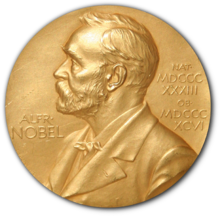Nobel Prize for Peace
| Nobel Peace Prize | |
|---|---|
 |
|
| Awarded for | Outstanding contributions in peace |
| Location | Oslo, Norway |
| Presented by | Norwegian Nobel Committee on behalf of the estate of Alfred Nobel |
| First awarded | December 10, 1901 |
| Most awards | International Committee of the Red Cross (3) |
| Official website | Nobelprize |
|
|||||||
|
|||||||

"...for his resolute efforts to bring the country’s more than 50-year-long civil war to an end, a war that has cost the lives of at least 220 000 Colombians and displaced close to six million people..."
|
|||||||
|
|||||||
Tunisian National Dialogue Quartet
(2015)
Juan Manuel Santos
(2016)
The Nobel Peace Prize (Norwegian: Nobels fredspris) is one of the five Nobel Prizes created by the Swedish industrialist, inventor, and armaments manufacturer Alfred Nobel, along with the prizes in Chemistry, Physics, Physiology or Medicine, and Literature. Since December 1901, it has been awarded annually (with some exceptions) to those who have "done the most or the best work for fraternity between nations, for the abolition or reduction of standing armies and for the holding and promotion of peace congresses".
Per Alfred Nobel's will, the recipient is selected by the Norwegian Nobel Committee, a five-member committee appointed by the Parliament of Norway. Since 1990, the prize is awarded on 10 December in Oslo City Hall each year. The prize was formerly awarded in the Atrium of the University of Oslo Faculty of Law (1947–89), the Norwegian Nobel Institute (1905–46), and the Parliament (1901–04).
Due to its political nature, the Nobel Peace Prize has, for most of its history, been the subject of controversies.
According to Nobel's will, the Peace Prize shall be awarded to the person who in the preceding year "shall have done the most or the best work for fraternity between nations, for the abolition or reduction of standing armies and for the holding and promotion of peace congresses".
...
Wikipedia
